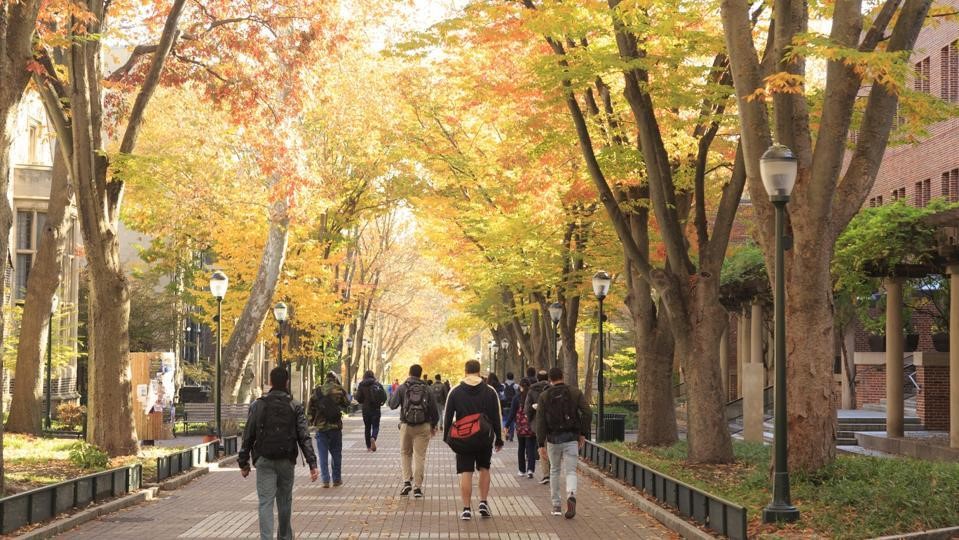
Most people don’t think twice when referring to colleges as universities or vice versa, and there’s no need to—in colloquial conversation, there’s no difference between the two. But we’re here to get into the details of things, and as it turns out, colleges and universities are not one and the same.
Both colleges and universities serve degree-seeking students with higher education. However, their difference lies in the kinds of degree programs offered, as well as their primary academic purposes.
Keep reading to learn what makes colleges and universities unique.
College vs. University: What’s the Difference?
The words college and university are often used interchangeably, but they’re not the same thing. While both offer undergraduate education, there are key differences.
Colleges tend to be smaller and focus on a specialized field of study. Class sizes and student populations are typically smaller than at a university. Some colleges are tailored toward specific ethnic or racial groups, religions and genders.
Universities typically have a larger student population than colleges do. Universities offer both undergraduate and graduate degrees. Most serve as research institutions.
What Is a College?
A college is a two-year or four-year higher education institution that offers certificates, associate and/or bachelor’s degrees. Colleges can be either public or private.
Colleges are typically smaller than universities, often providing degrees for specialized fields of study. Many community colleges, for example, award certificates and associate degrees (and sometimes bachelor’s degrees) in areas such as respiratory care, cybersecurity and automotive technology.
Different types of colleges exist to serve varying student populations and interests. Here are a few examples.
- Liberal arts colleges emphasize subjects in the humanities, language, arts and natural sciences. They aim to provide a holistic education to shape better communicators and critical thinkers.
- Vocational colleges or trade schools prepare students to enter fields that require a high degree of training. Trade school graduates often pursue careers in fields like plumbing, dental assisting and culinary arts
- Community colleges offer two-year associate degree programs that prepare students to transfer to a four-year institution. Some community colleges also provide professional certificates.
- Specially designated colleges are designed for specific student populations. Historically Black colleges and universities are a good example of this.
What Is a University?
A university is a four-year institution that offers undergraduate and graduate degrees. Unlike colleges, some universities enroll tens of thousands of students across undergraduate and graduate levels. This large enrollment is more common for public universities; private universities are generally more selective and can be much smaller than their public counterparts.
Because universities provide master’s and doctoral degree programs, many offer more advanced research opportunities than colleges do. Additionally, many universities are home to specialized institutions like law and medical schools.
What Is a College Within a University?
Colleges within universities are smaller institutions that focus on a particular field of study. Examples of this include the Weinberg College of Arts and Sciences at Northwestern University, the College of Business Administration at Marquette University and the UC Berkeley College of Engineering.
Note that even if you study in a college within a university, you’re still considered a university student.
Should You Attend a College or a University?
Ultimately, the answer to this question depends on your specific academic and career goals. It’s also helpful to consider your learning style and what you hope to gain from your college experience.
If you’re interested in a highly specialized field of study, you may find that studying at a college is the right option. Similarly, students who learn best in smaller classes and with closer access to their professors would benefit from a college education.
If you’d like to pursue a graduate degree or conduct research as part of your studies, a university education could be the right fit. Universities are known for their larger class sizes, so students don’t always develop close relationships with their professors. If you consider yourself a self-starter or have access to other support like tutors or study groups, a university education could work well for you.
Frequently Asked Questions (FAQs) About Colleges vs. Universities
What is better, university or college?
Both colleges and universities offer post-secondary degrees, so ultimately, it’s up to you to decide what’s a better fit for your goals. Colleges tend to be smaller and offer more specialized fields of study; universities are much larger, place heavy emphasis on research and award master’s and doctoral degrees.
Is Harvard a university or a college?
Harvard is a university. However, there are colleges within the university, including Harvard College and the John A. Paulson School of Engineering and Applied Sciences.
Can a college be called a university?
College and university are often used interchangeably in casual conversation. However, colleges differ from universities in that they don’t offer graduate degrees.
Is a college more difficult than a university?
Colleges aren’t necessarily designed to be more challenging than universities. However, it depends on your personal learning style, as well as the specific institution you attend. Some students might find the smaller class sizes of college challenging; others might enjoy the experience.
